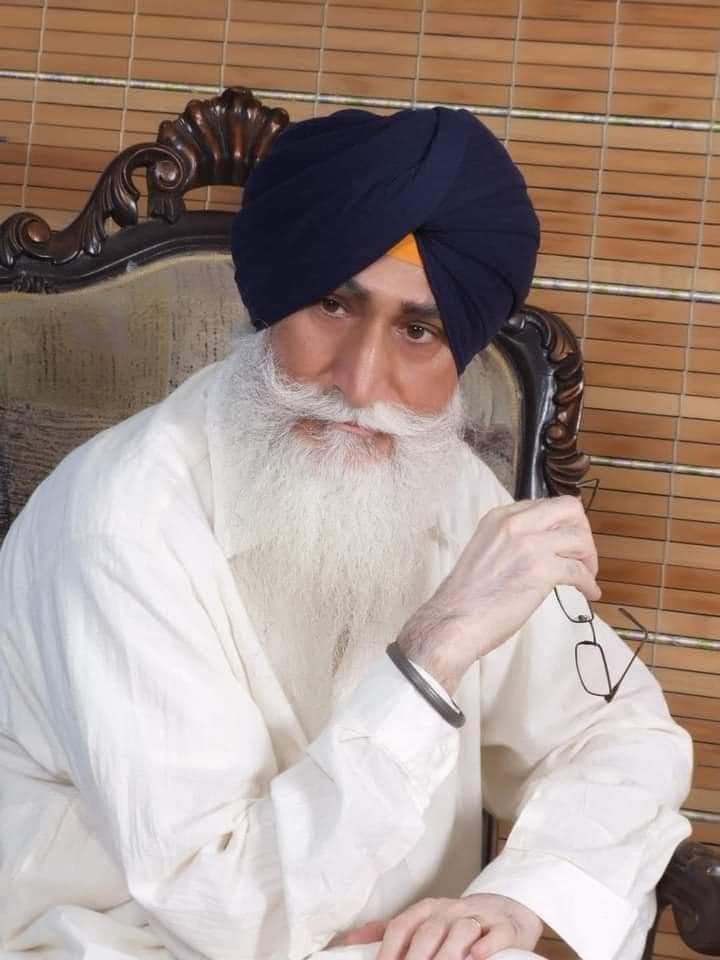Eyes of the Sikhs struggling for their rights and freedom in India got teary as they heard about the passing away of Bhai Gajinder Singh who dedicated his entire life for Panth (Sikh community), in Pakistan-administered Punjab. He led his colleagues in hijacking an Indian Airlines aircraft to Lahore in 1981, but this action was carried out for genuine cause and it was basically an unprecedented protest against the tyrannical practices of Indian State against the minority community.
Till his last sigh, he lived for freedom of Punjab which is homeland of Sikhs and currently administered by Indian State. Even as he spent considerable part of his life in exile and without family members, he always remained in Charhdi Kla (the term used by Sikhs for state of being in high spirit). He never let dream of Sikh freedom die in his eyes and wished it till last sigh. His life was full of sacrifices. He made sacrifices at every stage of his life.
He was born on 19 Nov 1951 at Patiala. His family shifted to Chandigarh in 1960. From the beginning, he had the makings of a radical. Rebellion was there in his blood. He turned rebel against the fascist nature of the Indian State. His actions were aimed at betterment of the community which was betrayed by the Indian leaders after de-colonization of the south Asian sub-continent.
His mother, Ranjit Kaur, was the main source of inspiration behind his dedication towards the Sikh cause, say the Sikh activists who remained close to him.
He was the architect of reorganization of Dal Khalsa, a historic organization under which all the groups got united centuries ago to fight against foreign invaders, in 1978. This organization is still active in Punjab and working for the freedom of the Sikhs.
“Gajinder Singh belongs to that Sikh school of political thought which believes that the national identity of the Sikhs can only be safeguarded with the establishment of an independent homeland”, writes Jagmohan Singh, a Sikh activist and journalist, in an article written many years ago.
Gajinder Singh completed his graduation in Arts at the age of 20. While he was in college, he plunged into active politics. He soon became a part of a group of young reformists under the dynamic leadership of Sirdar Kapur Singh.
What prompted Gajinder Singh to take up the cudgels against the Indian leaders was their refusal to hand over Chandigarh to Punjab in the wake of the martyrdom of Darshan Singh Pheruman on 27 October 1969.
Gajinder Singh shot into the limelight in December 1971 when he disrupted a rally addressed by the then Prime Minister of India, Indira Gandhi, to lodge a protest against Indian leadership for their betrayl of partition promises made to the Sikhs. His note rejected the earlier decision of the Sikh leadership for joining India. This note talked about the freedom of Sikh homeland.
The State victimized him in various ways. The Police framed false case against him, under the Arms Act in 1972. During the emergency, he was detained in Burail jail along with his two colleagues.
“It was during that period when his poetry started glittering in the darkness of jail with the enlightened ideology of revolution and freedom”, writes Jagmohan Singh.
Gajinder Singh served in the Education Department at Punjab Civil Secretariat for 15 months before he as terminated from the job on the pretext that he was security risk. Gajinder Singh married Manjit Kaur in June 1980 and was blessed with a daughter on May 1, 1981.
He along with his aides hijacked the Indian Airlines aircraft from Delhi to Lahore on September 29, 1981, in protest against the release of slain militant leader Jarnail Singh Bhindranwale, who was illegitimately arrested in assassination case of pro-government and Hindu communal journalist Lala Jagat Narain. However, they did not harm anyone. Even the passengers of the plane praised them.
The video interview of one of the female passenger who was in the aircraft hijacked, clearly narrates the character of the Sikh activists including Gajinder Singh. She is seen saying, “The hijackers were very sweet. They were very nice people. They treated very nicely. They gave us all the comforts. They gave us all the facilities. They did not stop from going to the washrooms. They tried their best to make us feel comfortable”.
This interview was recorded by a TV channel when the aircraft landed at the airport.
After the hijacking incident, the only feeling of his parents was that “Whatever their son has done was in the service of the Khalsa Panth”.
Sant Bhindranwale who launched the struggle for Sikh independence, often mentioned the Gajinder Singh and his aides’ deed of hijacking the plane in his speeches.
Gajinder Singh and his associates hijacked a plane close to three years after similar hijacking by young Congress activists after the arrest of Indira Gandhi in 1978. Sikhs have been drawing a contrast between how the hijackers in these cases were treated.
Bhola Pandey and his friend Davendar Nath Pandey hijacked IA flight IC410 on December 20, 1978 and were released shortly. Since then, Pandey was continuously rewarded– first Congress gave him tickets for assembly and then for Lok Sabha. Bhola Pandey was Congress candidate for Salempur Parliamentary constituency in 2014 for the fourth times in a row.
“In both the cases, there were striking similarities–hijackers neither possessed weapons nor did they harm any passengers while their action was focused on registering the protest and seek the release of their respective leaders. The big difference was Gajinder Singh did it for a Sikh leader, against whom nothing was found in the case in which he was arrested. Not only case against Pandey was dropped he was projected as hero and rewarded for hijacking, while our leader Gajinder Singh was declared a hardcore terrorist even as he underwent imprisonment close to 14 years. Such double standards and discriminatory approach further alienated the Sikhs”, English Daily The Times of India (TOI) quoted Dal Khalsa leader Kanwarpal Singh as saying in a story published recently.
This is another big example of dual standards of Indian State which treats Sikhs as second class citizens.
Arrested at Lahore after the hijacking incident, he served imprisonment till 1995 in Kot Lakhpat Rai jail of Lahore. Since his release, Gajinder Singh lived in exile.
While Gajinder Singh was serving his life sentence, his mother, Ranjit Kaur, passed away on September 26, 1991 and father S. Manohar Singh, on 11 December 1992.
Jagmohan Singh added, “Gajinder Singh’s courage of conviction remains undiminished despite 13 years of incarceration. He is known for his radical theme. ‘Azadi’ is his favourite mantra. Though the demand for s Sikh homeland has been pushed into the background, Sikh thinkers and chroniclers of contemporary Punjab history acknowledge the role of Gajinder Singh in building and consolidating the movement for Sikh national liberation”.
“Gajinder was product of times in which every attempt at betterment of the Sikhs had come to nought. He is good Sikh and an inspired poet of very sharp sensitivities, writes Gurtej Singh, former IAS, in his book, “Tandav of the Centaur”.
After the terror attack on Indian parliament, the Ministry of Home Affairs released a list of 20 persons to give to Pakistan to extradite these persons. Gajinder Singh was also on this list. This move gave much pain to the Sikh psyche. He was rebel but never indulged in the violence, yet he was declared as “terrorist” wanted by India. In recent years, Sikh lawyer Gurpatwant Singh Pannu and Hardeep Singh Nijjar who was recently assassinated by the men of Indian agencies, were also declared as “terrorists”, despite their peaceful and democratic mission of demanding right to self determination.
Living in Nankana Sahib, which is birth of Sikhi’s first Guru Sri Guru Nanak Sahib in Pakistan-administered Punjab, Gajinder Singh was running a health centre in the name of his wife Manjit Kaur who passed away in 2019 in Germany, to help the needy people.
His daughter Bikramjit Kaur lives in the United Kingdom.
Gajinder Singh made his debut as a revolutionary poet in 1993 with a collection of poems, entitled ‘Panj Teer Hor’ followed by ‘Wasihatnama’ and ‘Gangoo di Rooh’. Gajinder Singh has been vociferous in his criticism of the Indian rulers. He penned down nine books that also advocated the separate Sikh state. He was active on the social media and often shared his poems and views. However, his social media accounts were banned several times by Indian government.
In 2020, Akal Takht announced a title of ‘Sikh Warrior in Exile’ for him during the tenure of Giani Harpreet Singh.
After his demise, executive committee of the Sikh parliament Shiromani Gurdwara Parbandhak Committee (SGPC) passed a resolution to pay to Gajinder Singh.



Leave a Reply